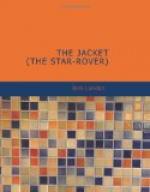It was a journey of many days, half the length of Cho-Sen, north and south as it lies. It chanced, at the first off-saddling, that I strolled around to witness the feeding of the dwarf horses. And what I witnessed set me bawling, “What now, Vandervoot?” till all our crew came running. As I am a living man what the horses were feeding on was bean soup, hot bean soup at that, and naught else did they have on all the journey but hot bean soup. It was the custom of the country.
They were truly dwarf horses. On a wager with Kim I lifted one, despite his squeals and struggles, squarely across my shoulders, so that Kim’s men, who had already heard my new name, called me Yi Yong-ik, the Mighty One. Kim was a large man as Koreans go, and Koreans are a tall muscular race, and Kim fancied himself a bit. But, elbow to elbow and palm to palm, I put his arm down at will. And his soldiers and the gaping villagers would look on and murmur “Yi Yong-ik.”
In a way we were a travelling menagerie. The word went on ahead, so that all the country folk flocked to the roadside to see us pass. It was an unending circus procession. In the towns at night our inns were besieged by multitudes, so that we got no peace until the soldiers drove them off with lance-pricks and blows. But first Kim would call for the village strong men and wrestlers for the fun of seeing me crumple them and put them in the dirt.
Bread there was none, but we ate white rice (the strength of which resides in one’s muscles not long), a meat which we found to be dog (which animal is regularly butchered for food in Cho-Sen), and the pickles ungodly hot but which one learns to like exceeding well. And there was drink, real drink, not milky slush, but white, biting stuff distilled from rice, a pint of which would kill a weakling and make a strong man mad and merry. At the walled city of Chong-ho I put Kim and the city notables under the table with the stuff—or on the table, rather, for the table was the floor where we squatted to cramp-knots in my hams for the thousandth time. And again all muttered “Yi Yong-ik,” and the word of my prowess passed on before even to Keijo and the Emperor’s Court.
I was more an honoured guest than a prisoner, and invariably I rode by Kim’s side, my long legs near reaching the ground, and, where the going was deep, my feet scraping the muck. Kim was young. Kim was human. Kim was universal. He was a man anywhere in any country. He and I talked and laughed and joked the day long and half the night. And I verify ate up the language. I had a gift that way anyway. Even Kim marvelled at the way I mastered the idiom. And I learned the Korean points of view, the Korean humour, the Korean soft places, weak places, touchy places. Kim taught me flower songs, love songs, drinking songs. One of the latter was his own, of the end of which I shall give you a crude attempt at translation. Kim and Pak, in their youth, swore a pact to abstain from drinking, which pact was speedily broken. In old age Kim and Pak sing:




